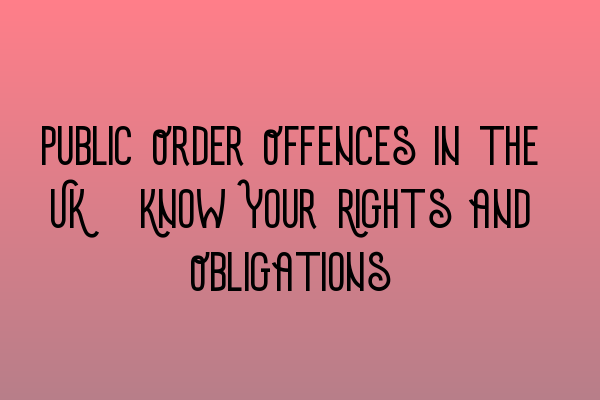Public Order Offences in the UK: Know Your Rights and Obligations
Public order offences are a significant aspect of criminal law in the UK. If you find yourself facing charges related to public order offences, it is essential to understand your rights and obligations. In this comprehensive guide, we will shed light on various aspects of public order offences, helping you navigate through this complex area of the law with confidence.
What are Public Order Offences?
Public order offences encompass a wide range of criminal behaviours that disturb or jeopardize public peace, order, and safety. These offences can include actions such as rioting, disorderly conduct, affray, public nuisance, and threatening or abusive behaviour. The UK legal system categorizes these offences under the Public Order Act 1986.
Understanding Your Rights
As an individual accused of a public order offence, it is crucial to know and exercise your rights to ensure a fair legal process. You have the right to legal representation throughout the proceedings. Seeking assistance from an experienced criminal solicitor who specializes in public order offences is highly recommended. They will provide guidance, protect your interests, and argue your case effectively in court.
Legal Obligations and Penalties
Being aware of your legal obligations under public order offences is essential to avoid potential penalties. Depending on the severity of the offence, penalties can range from fines to imprisonment. Factors such as the defendant’s intent, previous convictions, and the level of harm caused will be considered during sentencing.
If you are involved in public order offences, it is beneficial to seek professional legal advice at the earliest opportunity. A skilled solicitor will analyze the circumstances surrounding the offence and build a strong defense strategy tailored to your specific case. By having reliable legal representation, you can increase the chances of obtaining a favorable outcome.
Types of Public Order Offences
There are several types of public order offences, each carrying its own elements and legal implications. Some common public order offences include:
- Rioting: This involves a group of three or more individuals engaging in violent behavior in a public place. The objective is to cause fear, damage property, or disrupt public peace.
- Disorderly Conduct: Behaving in a disorderly manner in a public place, causing harassment, alarm, or distress to others.
- Affray: Engaging in violent or threatening behavior that causes others to fear for their safety. It typically involves at least two individuals.
- Public Nuisance: Carrying out an act that causes annoyance, damage, or inconvenience to the public, such as blocking roads or obstructing essential services.
- Threatening or Abusive Behaviour: Using words, gestures, or written materials to cause fear, alarm, or distress to others.
Each of these offences carries specific legal definitions and requirements for conviction. Understanding the elements of the offences and the burden of proof on the prosecution is crucial in building a solid defense.
Protecting Your Rights during Arrest and Detention
If you find yourself arrested or detained in connection with a public order offence, it is crucial to be mindful of your rights. Right upon arrest, you must be informed of the reasons for your arrest and cautioned. You also have the right to have someone informed of your arrest, preferably a solicitor, who can provide legal advice and support throughout the process.
SQE Criminal Law & Practice for Professionals
At SQE Criminal Law & Practice Law UK, we understand the complexities surrounding public order offences and the importance of legal representation in such cases. Our team of experienced solicitors specializes in criminal law and can provide you with the expert legal support you need. We offer SQE 1 and SQE 2 preparation courses to equip professionals with the knowledge and skills required to excel in their legal careers.
If you are seeking to enhance your understanding of criminal law or preparing for the SQE exams, we offer SQE 1 Practice Exam Questions and SQE 1 Practice Mocks FLK1 FLK2 to improve your knowledge and test your skills. Our SQE 2 Preparation Courses are designed to help you excel in the practical aspects of criminal law.
For more information about the SQE exams and important exam dates, visit our page on SRA SQE Exam Dates. Stay informed and take proactive steps towards a successful legal career.
Remember, knowledge is power when it comes to public order offences. Arm yourself with the understanding of your rights, seek expert legal advice, and be prepared for a strong defense. Trust SQE Criminal Law & Practice Law UK to provide you with the necessary guidance and support throughout your legal journey.
Disclaimer: This blog post is for informational purposes only and does not constitute legal advice. Consult with a qualified solicitor for professional legal assistance tailored to your specific situation.
